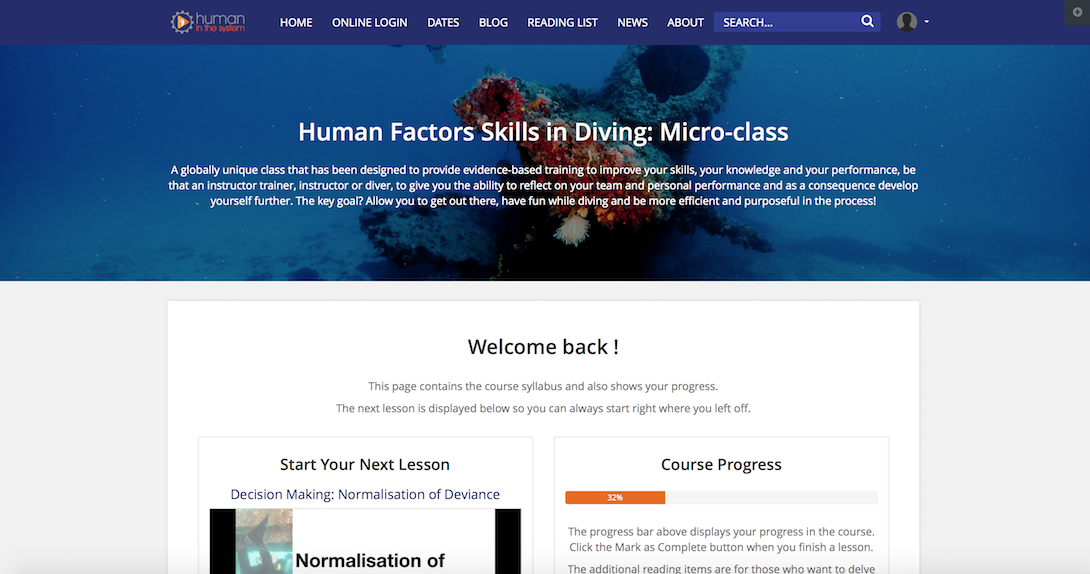Human Factors Skills in Diving Micro-class Pre-Course LearningMost accidents and adverse events in diving are not down to undetected technical failures, but rather a breakdown in communication, poor decision-making or a lack of situational awareness, or more likely a chain of events which are based around these human factors.
Most accidents and adverse events in diving are not down to undetected technical failures, but rather a breakdown in communication, poor decision-making or a lack of situational awareness, or more likely a chain of events which are based around these human factors.

This course emphasizes how important “human factors” are when diving which is why I recommend the micro-class as pre-learning for my classes.
Most accidents are not down to failures of equipment or ‘technical skills’ rather they are down to misdirected situational awareness, poor decision making, incorrect assumptions, miscommunications, ineffective leadership and teamwork.
The online class provides a grounding for students to understand ‘human error’ in more detail, to recognize the essential skill of learning from failure and crucially the need to be able to talk about incidents as learning opportunities rather than being ashamed or afraid to discuss those ‘safe, scary moments’. Prediction of human error is better than error prevention which is better than error mitigation.

Human Factors Course Instructor: Gareth Lock
Gareth Lock is a retired Royal Air Force senior officer Navigator of 25 years, who was both a senior supervisor and a tactical flight instructor on an operational C-130 flying squadron. He has a MSc in Aerospace Systems from Kingston University and spent his last 5 years in the RAF as a Requirements Manager for Defensive Aids Systems working across all levels of industry, reseach and the military from front-line user to very senior officers, both in the UK and in the US, often at highly classified levels.
Gareth is an Open Circuit advanced trimix diver (Technical Diver Level 2 with Global Underwater Explorers) and normoxic trimix CCR diver (JJ-CCR with TDI) with around 800 dives over 12 years of diving. He is also an accomplished underwater photographer with a deep interest in cold, green water wreck diving.
Shortly after leaving the RAF in 2014, he delivered eight months of Well Operations Crew Resource Management (WOCRM) training and coaching to oil workers in an offshore environment, the results of which were presented by Gareth and Phil Smith (Managing Director of Critical Team Performance) at the oil and gas industry's international (IADC Human Factors) conference in Houston. In June 2015, Gareth completed the TOP-SET three-day Senior Investigator root cause analysis course, considered an industry standard in Oil & Gas, heavy industry, and rail incident and accident investigation.
In 2012, Gareth started his PhD, examining the role of human factors in scuba diving incidents. He is published in a number of magazines and journals, has presented at nine international diving conferences on Human Factors in diving, and manages the Diving Incident and Safety Management System incident database.
He has recently been appointed Global Underwater Explorer's Director for Risk Management, responsible for developing the performance of instructors and instructor trainers and building a Just Culture within this learning-cultured organisation.
In 2016, he developed and launched the Human Factors Skills in Diving high performance development programmes to improve the knowledge, skills and safety of all divers. These consist of an online programme suitable for all divers and a classroom-based class aimed at instructors, instructor trainers and those undertaking higher risk diving such as techincal divers and cave divers.
